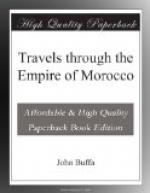Practice of Physic—Astrology—Poetry—Entertainment given by the Author to the Moors—Their Astonishment at the Effects of Electricity.
Mequinez.
I shall now speak of their principal or rather only studies, which are, physic, astrology, and poetry. First then of physic, to give you an accurate idea of the extent of their knowledge in which, it will be sufficient to describe their practice of it; and I am sure you, my dear D——, and every other friend to humanity, will agree with me, that it would have been better for their countrymen if they had never attempted it at all, as unassisted nature would do more, for those afflicted with disease, than such bunglers.
The general practice adopted by the Moorish physicians, or Tweebs, is, bleeding ad deliquium in all fevers; administering excessive doses of drastic medicines, plenty of emulsions, and a watery diet. They order vinegar in cases of quinsies and ardent fevers, and garlic in those of a putrid, malignant, and pestilential kind. They prescribe alum in cases of hemorrhage and dysentery; hot spices and long abstinences in chronic diseases; recent ox-gall to kill worms and cure dropsies; castor and myrrh in all hysteric affections; asses milk in slow fevers and consumptions; oranges, honey, eggs, mint, and myrrh, in cases of typhus; poppy-juice in convulsive disorders and fluxes of the bowels; pitch or tar water and pennyroyal in common fevers; rose-leaves in cases of diabetes; and sulphur in all cutaneous disorders. This is the whole of the Moorish materia medica. In simple diseases, where little medical ability is necessary, and the good habit of body of these people in general contributes to their success, they may effect a cure; but in desperate cases, where nothing but the skill of the physician can relieve oppressed nature, it is not astonishing that they should fail. These men are in some measure astrologers: most probably, being gifted with a greater degree of cunning than their neighbours, they have discovered the weak side of their countrymen, together with their own insufficiency, to cover which they pretend to a knowledge of the stars, which has the greatest weight with the superstitious Moors; consequently, when a patient, either by their improper treatment, or the violence of his disease, evinces symptoms of approaching dissolution, the doctor, with infinite gravity, points out to the surrounding relations the star which, he positively asserts, appears to summon the dying man to the bosom of his Prophet. By this means he avoids reproach, since he has made it so evident, that the poor man’s time was come, and that nothing could ward off the shafts of destiny. This apparently wonderful faculty of prognostication, added to their exemplary mode of living, and liberal donations to the poor and afflicted, operating upon the minds of the blind and fanatic Moors, induces them to consider their physicians next to their saints, and to worship them with nearly as much reverence.




